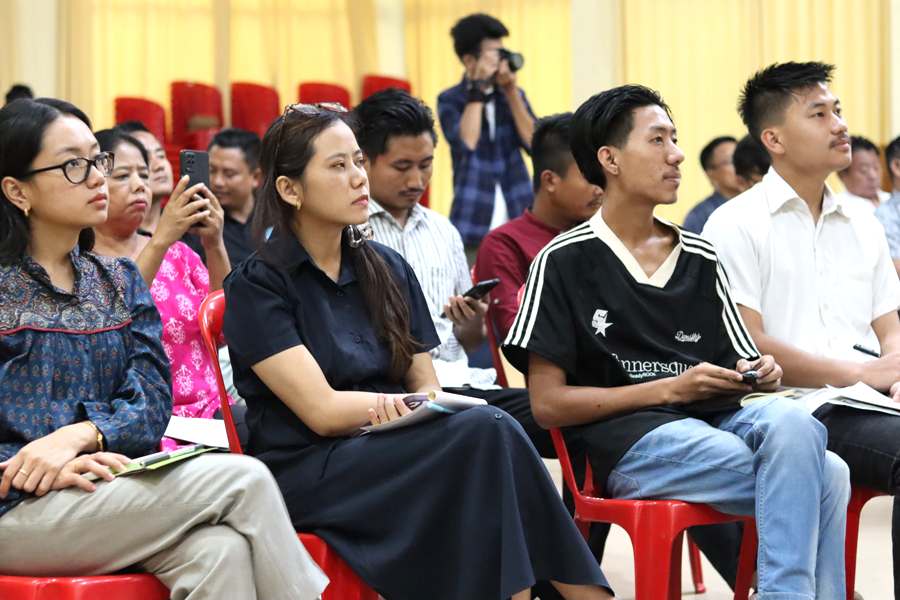WEDNESDAY, JULY 16, 2025
- Home
- Pro Rural organises workshop on ‘Best practices of waste management’
Pro Rural organises workshop on ‘Best practices of waste management’
A one-day workshop on ‘Best practices of waste management’ was organised by Pro Rural at Don Bosco Institute for Development & Leadership, Dimapur, on July 11.
Published on Jul 13, 2025
By EMN
Share

DIMAPUR — A one-day workshop on ‘Best practices of waste management’ was organised by Pro Rural at Don Bosco Institute for Development & Leadership, Dimapur, on July 11.
The programme was attended by officials of the district administration, Dimapur Municipal Council (DMC), Nagaland Pollution Control Board (NPCB), and a host of concerned NGOs, institutions, environmental activists and student representatives.
According to an update, the objective of the workshop was to deliberate and promote better waste management practices for Dimapur city, especially in the wake of the recent floods following torrential rains.
The facilitators of the workshop from Pro Rural, DMC, NPCB, E-Circle, etc., all highlighted the urgency of bringing a transformation in the waste management system, involving every citizen of the city to go through a mind-set change and adopt better civic sense. This, they felt, can be achieved only through mass-sensitisation programmes.
Director of Pro Rural, Paul Lokho, outlined three urgent steps to improve solid waste management. He emphasised that effective waste management needs 80% citizen participation in awareness programmes.
Lokho also shared that Dimapur can achieve effective waste management through a Public-Private-Partnership (PPP) model, involving capable NGOs, village institutions, and enterprising youth alongside the DMC.
Also read: Nagaland University launches RD & Management programme
Centre urges states to crack down on fake and substandard fertilisers
Further, he suggested engaging school students through a fun, rewarding, and impactful programme, citing the ‘Zero litter campaign’ as an example, with a reward system to motivate students.
Revenue Officer Bendang Longkumer highlighted Dimapur's challenges, especially post-floods, emphasising the need for civic education to prevent encroachment of drains and water bodies, and advocated for large-scale community participation in sensitisation programmes.
DMC consultant Adrian Mahung presented data on Dimapur's waste management, revealing that the city generates 74.6 metric tons of waste daily, with a per capita rate of 0.43kg, exceeding the national average. He highlighted gaps in the system, attributing them to weak public engagement, poor segregation, and inadequate planning.
A particular area of concern was on the increasing volume of non-biodegradable waste like sanitary pads and diapers.
The DMC consultant proposed key recommendations, including strengthening public participation through education and grassroots involvement, ward-wise segregation with rewards for good performance, implementing ‘waste to wealth’ initiatives, and involving waste workers in planning and decision-making.
Scientist Yanthung from NPCB highlighted the state's waste management gaps, citing lack of infrastructure and modern scientific handling. He warned of severe environmental and health implications, including microplastic contamination and toxic waste consumption by animals that eventually reach humans. He called for coordinated efforts between authorities, civic bodies, and the community to address these challenges.
The scientist also highlighted a concerning issue: animals feeding on toxic waste, which eventually gets consumed by humans, creating a hazardous food chain. He emphasised the need for coordinated efforts between authorities, civic bodies, and the community to implement safe waste disposal and sustainable practices, building on steps already taken by the NPCB.
During the post lunch sessions, many individual activists proposed action plans for youth, community, and institutions, with environmental groups like E-Circle, Peace Channel, Bethesda, and Prodigals' Home advocating for broader discussions
Recommendations included overhauling municipal councils and ULBs, adopting PPP models, and leveraging pulpits to promote civic sense and waste management practices, with pastors as key stakeholders.
The workshop emphasised a collaborative approach, uniting urban local bodies, youth, NGOs, and institutions to reshape Nagaland's waste management through shared responsibility, aiming to make the state a smart waste performer in the next decade.

